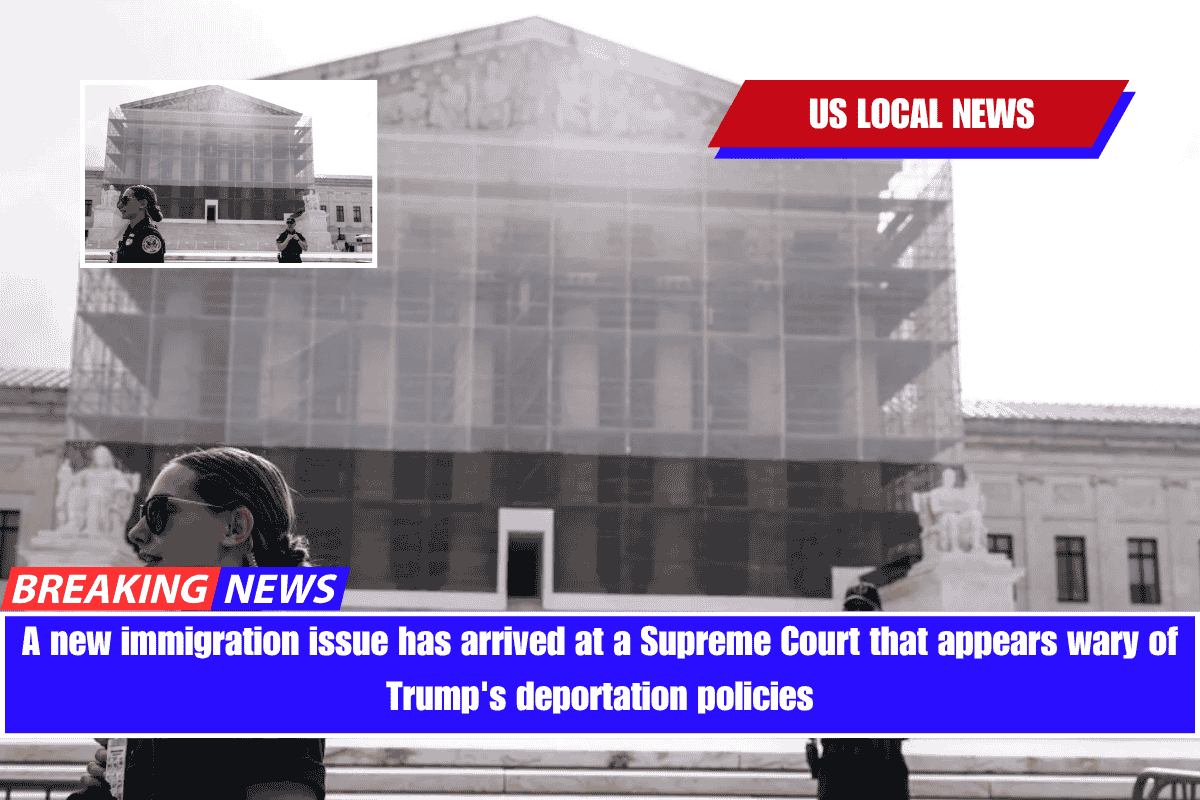An appeal filed in the Supreme Court on Tuesday could put the justices’ growing concern about President Donald Trump’s aggressive deportation policies to the test, as well as his willingness to defy judicial orders.
The new administration’s case stems from its desire to deport migrants to South Sudan and other places where they have no connection, without providing adequate notice or opportunity to contest their removal. A US district court judge in Boston said last week that the administration “unquestionably” violated his order by launching deportation flights and giving migrants little time to challenge their removal to war-torn South Sudan.
Regardless of how the justices respond to this latest deportation case, the controversy highlights the growing distrust among conservative justices regarding Trump’s immigration agenda.
This is one area where his norm-breaking approach, which usually divides the justices along ideological lines, has brought them together.
The trajectory of previous cases involving Venezuelan migrant deportations under the wartime Alien Enemies Act, as well as the justices’ oral arguments in a birthright citizenship dispute, demonstrated this.
One of the most tense moments in the May 15 hearing occurred when Justice Amy Coney Barrett asked US Solicitor General D. John Sauer if he was saying the administration could defy a court order.
“Did I understand you correctly to tell Justice (Elena) Kagan,” Barrett explained, “that the government wanted to reserve its right to maybe not follow a Second Circuit precedent, say, in New York because you might disagree with the opinion?”
“Our general practice is to respect those precedents, but there are circumstances when it is not a categorial practice,” Sauer told me.
“Really?” Barrett said, leaning forward on the bench and pressing on, looking for an answer indicating adherence to court orders. She changed the hypothetical scenario to include the High Court itself.
“You would respect the opinions and judgment of the Supreme Court,” she was saying. “You’re not hedging at all with respect to the precedent of this court?”
“That is correct,” Sauer replied.
Barrett was not the only conservative who echoed liberal Kagan’s concerns or questioned the Trump administration’s regard for Supreme Court rulings.
“I want to ask you one question about something in your brief,” Justice Brett Kavanaugh said to Sauer. “You stated, ‘And, of course, this Court’s decisions establish controlling precedent throughout the country. If this Court rules that a challenged statute or policy is unconstitutional, the government will be unable to enforce it against anyone, party or not, under stare decisis. Do you agree with that?
“Yes, we do,” Sauer replied.
South Sudan deportations may test conservatives
The conservative-dominated Supreme Court frequently sides with Trump. The justices have agreed with many of his arguments for increased executive branch authority. Last Thursday, the justices’ familiar 6-3 split strengthened the president’s control over independent agencies, in this case intended to protect workers.
However, the justices have shied away from Trump’s immigration crackdown due to his uncompromising approach.
With Tuesday’s case testing the deportation of migrants to places where they may face persecution and have no meaningful opportunity to contest their removal, new fissures may open up. The migrants that the administration intended to send to South Sudan are currently being held at a US military base in Djibouti. The migrants come from a variety of countries, including Vietnam, Mexico, and Laos, and they all have criminal records, according to the Department of Homeland Security.
US District Court Judge Brian Murphy, who said last week that the administration violated his order by conducting the deportation flight, reiterated on Monday that the detainees are entitled to due process. “To be clear,” he stated, “the Court acknowledges that the class members at issue here have criminal records. But this does not affect due process.”
Sauer argued in the administration’s filing to the Supreme Court on Tuesday that the administration had followed Department of Homeland Security policy for such third-country deportations.
He wrote in opposition to Murphy’s decision: “The United States has been put to the intolerable choice of holding these aliens for additional proceeding at a military facility on foreign soil – where each day their continued confinement risks grave harm to American foreign policy – or bringing these convicted criminals back to America.”
The court’s response to the plethora of Trump cases arising from his numerous executive orders has been varied, defying any common thread. Trump has occasionally won out in the immigration debate. On May 19, for example, the court permitted him to withdraw the Biden administration’s temporary humanitarian protection for hundreds of thousands of Venezuelans living and working in the United States. Only Justice Ketanji Brown Jackson dissents.
Abrego Garcia case undermined justices’ trust
However, Trump’s push to deport migrants deemed dangerous without due process has clearly fueled distrust in the federal judiciary.
The Supreme Court justices’ trust in Trump has been further eroded by the administration’s stalling on the return of Kilmar Abrego Garcia, a Maryland man who was wrongfully deported to El Salvador in mid-March and imprisoned.
On April 10, the justices ordered the administration to “facilitate” the Salvadoran national’s return to the United States. He’s still not home.
In a more recent detainee case, on May 16, the Supreme Court majority referred to Abrego Garcia as it expressed renewed concern – and consensus – about Trump’s use of 18th-century wartime law for deportations. On April 7, the justices divided bitterly over Trump’s attempt to use the Alien Enemies Act against Venezuelan migrants accused of belonging to the Tren de Aragua gang.
Chief Justice John Roberts and the majority of conservatives clashed with liberals, who warned that the majority’s decision, which largely favored the administration, failed to account for the “grave harm” that alleged Venezuelan gang members would face if deported to a Salvadoran prison, as Trump desired.
“The Government’s conduct in this litigation poses an extraordinary threat to the rule of law,” the liberal justices stated. “The majority of this Court now rewards the Government for its behavior is indefensible.” We, as a nation and a court of law, ought to be better than this.”
However, as Trump has increased his deportation efforts, the court’s votes on the Alien Enemies Act have shifted. And on May 16, a new majority of liberal and conservative justices expressed concern that migrants would be deported without due process.
It was becoming clear that the Trump administration was only reluctantly, if at all, complying with the court’s previous order that the Alien Enemies Act required due process. Lawyers for detainees claimed they were given insufficient notice and short deadlines for challenging their cases.
Lawyers for a group of Venezuelan migrants being held in a north Texas detention center requested an emergency order to prevent them from being rushed out of the country; the justices responded by halting deportations in the early morning of April 19.
After more time to review the situation, the court extended the freeze on May 16 and ordered a lower court hearing to determine whether Trump was lawfully invoking the Alien Enemies Act, which has been used only three times since the country’s inception, and only during wartime.
“Evidence now in the record (though not all before us on April 18) suggests that the government took steps on the afternoon of April 18 toward removing detainees under the AEA, including transporting them from their detention facility to an airport and later returning them to the facility,” the justices wrote in an unsigned opinion joined by conservatives and liberals.
Referring to the court majority’s April 19 middle-of-the-night order preventing those deportations, the justices added, “Had the detainees been removed from the United States to the custody of a foreign sovereign on April 19, the Government may have argued, as it has previously argued, that no U.S. court had jurisdiction to order relief.”
To emphasize this point, the majority cited the Abrego Garcia case as evidence that the administration may claim it cannot return wrongfully deported detainees. (On May 16, Justices Samuel Alito and Clarence Thomas dissented from the order suspending use of the Alien Enemies Act.)
Nationwide injunctions at issue in birthright citizenship case
Perhaps the most important court test in the early months of Trump’s second presidency will be the resolution of the dispute over injunctions preventing Trump from terminating birthright citizenship for babies born in the United States to undocumented immigrants or those with temporary status.
The right dates back to the 14th Amendment’s ratification in 1868 and has been reinforced by Supreme Court precedent since 1898.
The legal issue in the case heard on May 15 is not the overall constitutionality of Trump’s move to repeal the birthright guarantee, but rather the method used by lower court judges to temporarily block Trump’s order signed on his first day back in office. US district court judges have issued “nationwide injunctions,” in which a single judge prevents the enforcement of a challenged policy not only in the judge’s district but across the country. Trump wants the injunctions to apply only to individual parties to a lawsuit in a specific district.
Some justices have previously suggested that lower court judges acted beyond their authority by issuing such broad injunctions. However, Trump’s decision to end more than 150 years of automatic birthright citizenship may cause some of them to reconsider their position.
“Let’s just assume you’re dead wrong,” Kagan told Sauer about the legality of Trump’s executive order. “Does every single person affected by this EO need to bring their own suit? Are there alternatives? How long does it take? How do we get to the point where there is a single rule of citizenship that we have historically applied rather than the rule that the EO would have us follow?”
Conservative Justice Neil Gorsuch also questioned whether “patchwork problems,” such as babies born in the United States to undocumented migrants with different citizenship rights depending on the state, could “justify broader relief.”
The remarks reflected a larger dilemma for a court that has pushed its own boundaries. Some of Trump’s positions benefit the justices, while others are so extreme that they rattle the justices’ own assumptions.













Leave a Reply